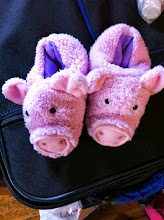Recap from the D-meeting last night...
-Learned that the Navigator has the largest insertion needle, at 21 gauge. However, the thing that actually stays in the skin and "senses" is only 5mm. I have never tried a Navigator(I probably would if the situation ever presented itself) so I really can't comment, but the Medtronic needle is 22 gauge and the Dexcom's is 26. The bigger the gauge, the smaller the needle.(and the Medtronic one hurts like the dickens) At this point, I'm very much partial to the Dexcom, for that & other reasons.
- I knew this before, but it was reinforced strongly last night(into my thick skull): DO NOT TREAT BLOOD SUGARS OFF YOUR CGM. Especially lows, since the lag time is even greater then.(blood goes to the vital organs,not so much to the skin) Highs, it isn't so bad to treat off your cgm(which I'll do, if I've been really stable blood sugar wise, it is generally very close on the meter) Meters aren't that accurate, cgm's aren't accurate, and it's really all just a crap shoot anyway. However, if you are swinging like heck it's always best to go off the meter results, the cgm doesn't have a chance of being anywhere in the real blood glucose ballpark.
-Dexcom has plans to make the receiver to send signals to an alarm clock, which will ring, should the user fail to respond to any alarms.(at night) I would not be wild about that option, until the thing gets a whole lot more accurate. Generally the vibration wakes me from the dead anyway.(I put it under my pillow)
-Tylenol can effect sensor readings for up to 3 hours after taking it; it's helpful to know precisely how long it will be screwed up. It's best to turn off the sensor,and restart later.
- As people lower their a1cs, the greater the percentage shift of in-range blood sugars go...for someone with high a1cs, most of their in-ranges come from fasting prandial glucoses & horrid post prandial glucoses; as they lowered it, most of their in-ranges came from ppg. Having a wonderful,rock-solid fasting blood glucose(great basals overnight) is not enough to get me a good a1c-I gotta get those post-meal numbers down.
4 Steps to Successful CGM Usage:
A for Alarms should mean something. Double-check with the meter, to make the best decision.
B for Break it In. Most sensors aren't worth a flip in the first 12+ hours, so it's a good idea to put it in prior to switching over from the old sensor.
C for Calibration is key. With the Dexcom, it will take whatever you tell it and spit out an average of that, and your last blood sugar (can take several calibrations to get back on track) With all the cgms, a calibrated CGM is a much happier CGM.
D for Direction. Where were you, and where are you going?(blood sugar-wise) I'm glad the Dexcom has arrows now..on the older model, it didn't. That information is extremely vital, and helps me from overtreating/undertreating.
But for all that, it's still just a device, one that is a long way from perfect. CGM's are still in their infancy, it will take time to get right.(much to my disappointment, the endo didn't put up any of his own CGM downloads-probably they're just so perfect we'd all be bored to tears looking at them)
I was very much the baby there last night...in D-years. At one end of the scale, was a 62 year veteran, at the other end of the scale, was me.(11 years) In between, there was a 56,52,44,46,27,28,19,17,16,14(along with significant others) The endo had had it for 42 years. Being in that room with 200+ years of type 1 diabetes was just incredible.
Subscribe to:
Post Comments (Atom)





4 comments:
Great info about CGM. The more info we have about them, the better we can make it work for us. And I agree, the Medtronic CGM hurts like no other, that's the main reason I don't wear it as often.
I wear a Minimed CGM and I've never found it to be that painful. But I haven't worn a DexCom in years, so maybe if I tried both. But I don't think it's that bad. Good advice though!
I am currently on the navigator. It is very bulky and uncomfortable. I am switching to the Dexcom, hoping for more comfort then the navigator. The navigator also has a 10 hour calibration wait time and it is only used for 5 days total.
I bet that was a really great talk to be at. Thank you for rounding up the details for us.
I use the Navigator, and have also tried older versions of the Dex & MM. They all have their pros & cons, just like anything else.
Post a Comment